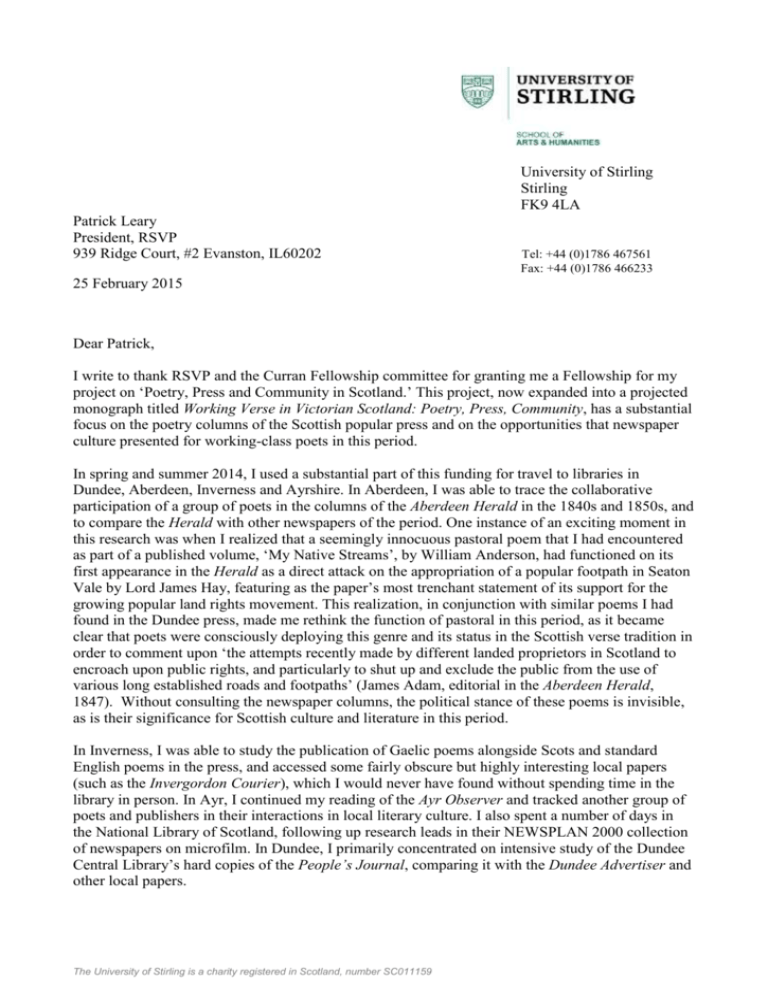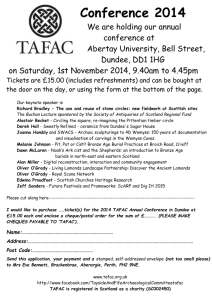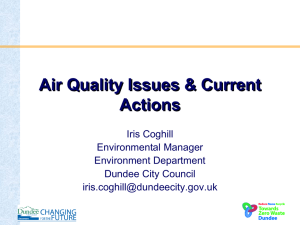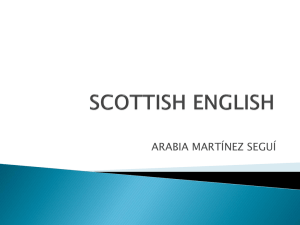Kirstie Blair
advertisement

University of Stirling Stirling FK9 4LA Patrick Leary President, RSVP 939 Ridge Court, #2 Evanston, IL60202 Tel: +44 (0)1786 467561 Fax: +44 (0)1786 466233 25 February 2015 Dear Patrick, I write to thank RSVP and the Curran Fellowship committee for granting me a Fellowship for my project on ‘Poetry, Press and Community in Scotland.’ This project, now expanded into a projected monograph titled Working Verse in Victorian Scotland: Poetry, Press, Community, has a substantial focus on the poetry columns of the Scottish popular press and on the opportunities that newspaper culture presented for working-class poets in this period. In spring and summer 2014, I used a substantial part of this funding for travel to libraries in Dundee, Aberdeen, Inverness and Ayrshire. In Aberdeen, I was able to trace the collaborative participation of a group of poets in the columns of the Aberdeen Herald in the 1840s and 1850s, and to compare the Herald with other newspapers of the period. One instance of an exciting moment in this research was when I realized that a seemingly innocuous pastoral poem that I had encountered as part of a published volume, ‘My Native Streams’, by William Anderson, had functioned on its first appearance in the Herald as a direct attack on the appropriation of a popular footpath in Seaton Vale by Lord James Hay, featuring as the paper’s most trenchant statement of its support for the growing popular land rights movement. This realization, in conjunction with similar poems I had found in the Dundee press, made me rethink the function of pastoral in this period, as it became clear that poets were consciously deploying this genre and its status in the Scottish verse tradition in order to comment upon ‘the attempts recently made by different landed proprietors in Scotland to encroach upon public rights, and particularly to shut up and exclude the public from the use of various long established roads and footpaths’ (James Adam, editorial in the Aberdeen Herald, 1847). Without consulting the newspaper columns, the political stance of these poems is invisible, as is their significance for Scottish culture and literature in this period. In Inverness, I was able to study the publication of Gaelic poems alongside Scots and standard English poems in the press, and accessed some fairly obscure but highly interesting local papers (such as the Invergordon Courier), which I would never have found without spending time in the library in person. In Ayr, I continued my reading of the Ayr Observer and tracked another group of poets and publishers in their interactions in local literary culture. I also spent a number of days in the National Library of Scotland, following up research leads in their NEWSPLAN 2000 collection of newspapers on microfilm. In Dundee, I primarily concentrated on intensive study of the Dundee Central Library’s hard copies of the People’s Journal, comparing it with the Dundee Advertiser and other local papers. The University of Stirling is a charity registered in Scotland, number SC011159 Since I was awarded the Fellowship, I have had a proposal accepted by the Association for Scottish Literary Studies for an anthology of newspaper verse, The Poets of the People’s Journal, to be submitted in spring 2016 for publication in their prestigious Annual Volume series in 2017. The ASLS annual volumes are reasonably priced and aimed at a general as well as academic market; they are also distributed to every member of the society. This will be the first general anthology of Victorian newspaper verse and I have been able to use my time in Dundee to select and contextualize a selection of poems that I hope will have wide appeal for readers and school and university teachers. In addition, exploring Dundee’s archives further last summer led to conversations with the head librarian of Dundee Central, Ms Judy Dobbie, and other staff in the Local Studies department about how they could best be used. We decided to submit an application for an Arts and Humanities Research Council Collaborative Doctoral Award, on the topic ‘Poetry, Song and Community in the Industrial City: Victorian Dundee.’ This application was successful (in a highly competitive field), and so a British or EU student will receive full funding and maintenance for 3 years (worth c.£57,000) to work on this PhD project with myself and the library from Oct 2015. The student will also make extensive use of Dundee’s outstanding collection of local newspapers and periodicals. Three other unexpected areas of interest that emerged during my research were the function of children’s verse in the popular press, the use of poetry in advertising, and the importance of emigrant poetry – poems sent ‘home’ to the newspapers from Scots abroad. Having realized in the course of my research that there was a large and completely forgotten subculture of working-class Scottish poetry for children, I am now writing an article on ‘The Nursery Poets of Victorian Scotland.’ Again, extensive research in the newspaper press has enabled me to see how some of these poems transferred from newspaper columns to anthology publication. I presented this material at the World Congress of Scottish Literatures conference in July 2014, and made connections through that panel that have led to a commissioned book chapter for an Ashgate collection on Scottish Children’s Literature in the Nineteenth Century, ed. Sarah Dunnigan and Shu-Fang Lai. My initial work on advertising poetry (materially assisted by advice from Andrew Hobbs at UCLAN, who has been studying this topic in the Northern English press) led to a very wellreceived paper at NAVSA 2014, ‘Class and the Classified: Advertising Verse and the Victorian Working-Class Poet’. I also disseminated my research in a public forum in a talk at the Mitchell Library, Glasgow, in May 2014 on working-class poets and politics in this period, again using many poems from the newspaper press. With regard to emigrant poetry, I have received internal funding to host a workshop on ‘Scottish Emigrant Literatures in the Long Nineteenth-Century’ on 14 March 2015, bringing together eminent and early career scholars in literature and history from Scotland, the UK and beyond, including Prof Mary Ellis Gibson and Prof Jason Rudy. I anticipate that this may lead to future collaborations in this rapidly developing field of study. In autumn 2014, I was invited to join Prof Gerry Carruthers and Dr Catriona Macdonald in Scottish Literature and Scottish History at the University of Glasgow in producing a collaborative £50,000 grant application to the Carnegie Trust, for researching and creating an online resource on ‘The People’s Voice: Scottish Political Poetry and Song, 1832-1918’. If this application proves unsuccessful, we will redevelop it in applications to other funding bodies. It is another topic on which my new knowledge of the poetic content of newspaper archives in local libraries has proved essential. Through working with Prof Carruthers, one of the world’s leading Burns experts, I have been invited to contribute an essay to the Oxford Handbook of Robert Burns, on the working-class newspaper poets and their transformations of Burns’ work in the Victorian period. I am happy to say that I have enough funding remaining from the Curran Fellowship to complete research in assorted Scottish archives in summer 2015 and beyond, including checking sources for the book chapter I am writing on ‘Newspaper Verse and the Victorian Working-Class Poet’, for the Cambridge History of Working-Class Writing, ed. Bridget Keegan and John Goodridge, due by The University of Stirling is a charity registered in Scotland, number SC011159 August 2015. In spring 2016 I am due research leave, and intend to use this period to produce several draft chapters of my next monograph for submission to readers at Edinburgh University Press. I hope to complete the monograph in 2018. Without this funding and some additional help from the Carnegie Trust for the Universities of Scotland, I would have had to use my own resources to travel to archives and my ability to conduct this in-depth research would have been far more limited. As this brief account makes evident, this primary research feeds directly into a number of forthcoming publications – all either entirely or substantively focused on the newspaper press in the Victorian period – and into funding applications and awards that benefit others as well as myself. I remain very grateful for the award, and will look forward to acknowledging it in my published work in this field. Yours sincerely, Kirstie Blair Professor Kirstie Blair kirstie.blair@stir.ac.uk The University of Stirling is a charity registered in Scotland, number SC011159








